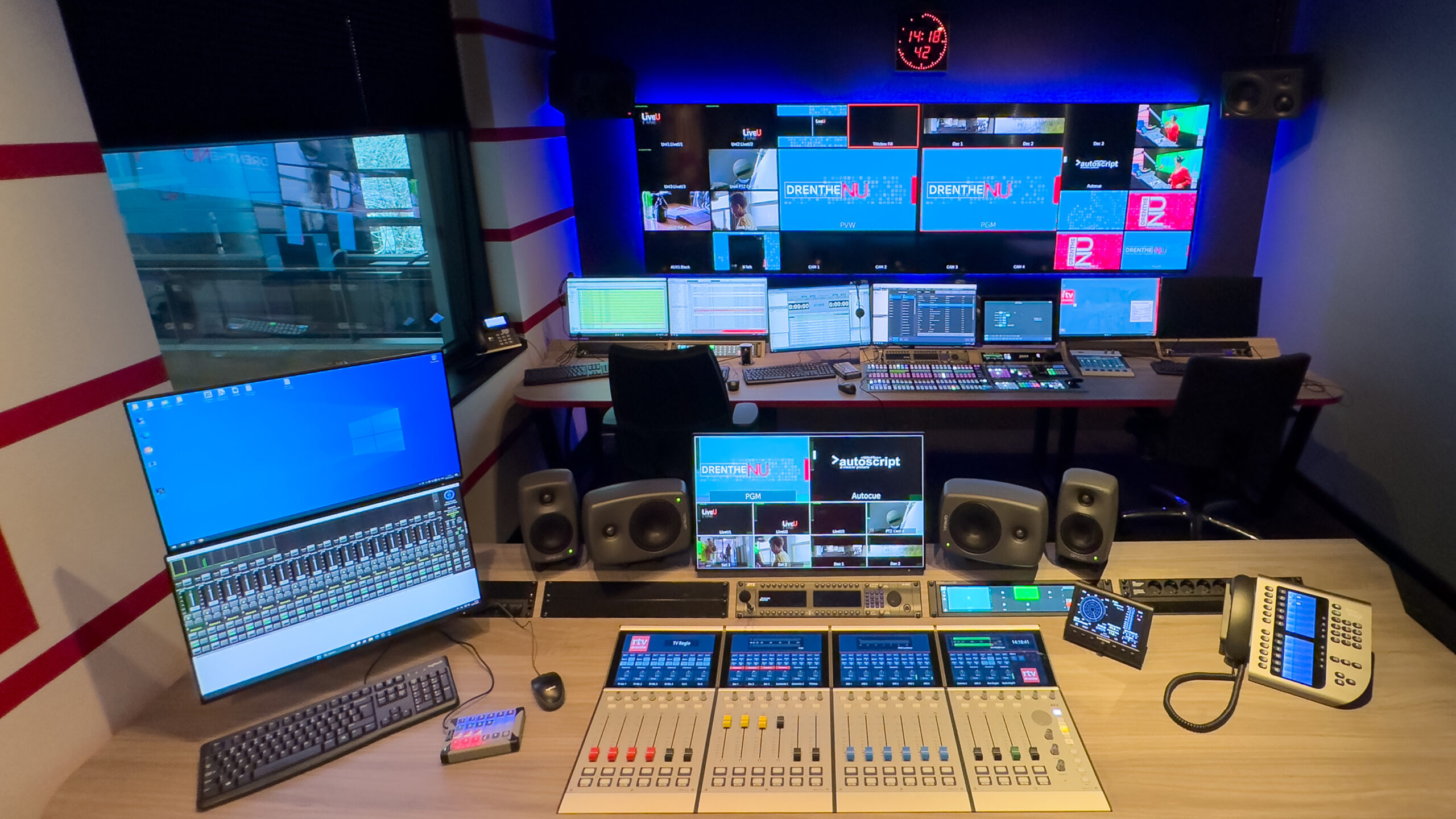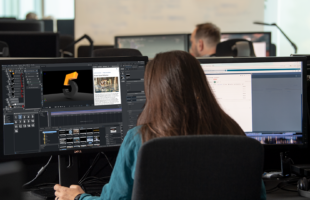
RTV Drenthe TV production control room showing DHD SX2 in foreground
RTV Drenthe, public broadcaster for the province of Drenthe in north-east Netherlands, has chosen DHD SX2 and TX audio mixing consoles for integration into newly upgraded facilities at the channel’s headquarters in Assen. The consoles form part of a production modernisation project centred on the television production control room. RTV Drenthe content mainly comprises local and regional news, interviews, music and talk shows, broadcasting 24 hours of radio a day, visual radio, a repeated 30 minutes of television, broadcasting of events and webcasting.
“The TV production control room was in need of renovation after almost 20 years of intensive daily use,” says Martijn Woering, RTV Drenthe technical project leader. “We have been using a DHD 4200 console and processing core installed in mid-2004 and our TV show was mixed on it every day. This set-up has always proved very stable and is now able to enjoy its retirement.
“We did a lot of research into latest-generation solutions before deciding on the DHD SX2 and TX, not least because they integrate well with the rest of our DHD environment; we also have DHD consoles in our radio studios, news editing rooms and video edit suites. DHD consoles are easy to use and all our production and technical support staff are already familiar with their operation.
“We designed, built and installed the new system in-house. The DHD equipment was supplied by Almere-based Media Utilities. We also replaced the video router and moved all TV equipment to the central equipment room, together with all radio and ICT equipment. Previously, all TV equipment was placed in a separate rack room elsewhere in the building. The DHD consoles allow all sources to be available everywhere within our system so we can relocate without interruption.
“Audio production is performed on a DHD SX2 with 22 faders. The TV director has a dedicated desktop DHD TX console so he or she can easily listen to incoming audio sources. The DHD is linked to our Ross Ultrix video router and RTS Odin AoIP intercom. This combination allows us to achieve a lot with a few simple mouse clicks and is very useful for special projects or larger TV shows.
“We use DHD RX audio consoles in our radio studios plus DHD TX consoles in the audio editing rooms and podcast studio. The video editing suites are all equipped with a DHD DX mixer. All cores in the building are interconnected with DHD Gigabit audio and/or Audinate Dante AoIP. Omroep Assen, the local broadcaster for Assen, is also located in our building. It is linked to our infrastructure and uses a DHD SX2 console for radio.
“DHD WebApps are used to monitor the system state and audio levels of all studios as well as outgoing feeds to the transmitters. DHD’s Views app allows us to create an HTML5 dashboard which provides a good overview of all relevant parameters. DHD’s Assist app allows us to help operators at any location even if we are not on site. From an edit suite on the news floor to the TV control room, our technicians can easily help or intervene if required.
“Our next project will be to integrate the DHD with Ross Overdrive. This allows us to semi-automate our TV show and ensure even greater flexibility and consistency.”
DHD’s SX2 console is based on a four-fader central module. Integral display screens allow operators to see exactly how their console is performing both from connectivity and signal level perspectives. The central module gives access to the most important audio inputs and outputs. A microphone input and headphone output are included, and loudspeakers can be connected directly to this unit. The consoles can be expanded by adding one or more module with six motorised faders each. Central and fader modules each incorporate a 10.1 inch multi-touch display showing relevant configuration and operating parameters. Functions such as loudness metering and talkback to other DHD mixers are also supported.
DHD’s TX mixers are ultra-compact tabletop touchscreen panels optimised for daily operation wherever space is at a premium. Typical applications include news desks, edit suites and communication link vehicles. Just 256 mm wide, 58 mm high and 272 mm front-to-back, the TX has a 10.1 inch display with capacitive touchscreen faders plus six hardware pushbuttons and two flexibly assignable potentiometers. Other features include an XLR microphone input, headphone output, integrated talkback microphone and a loudspeaker. A single network cable up to 100 metres in length connects the TX to a DHD IP Core or concentrator. The cable transmits all audio and control signals plus power.







